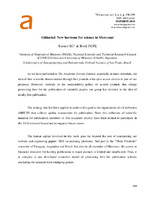| dc.creator | Ramos, Silvina Gabriela | |
| dc.creator | Bock, Eduardo Guy Perpetuo | |
| dc.date.accessioned | 2022-07-27T21:25:38Z | |
| dc.date.available | 2022-07-27T21:25:38Z | |
| dc.date.issued | 2019-12-12 | |
| dc.identifier.citation | Ramos, S. G, Bock, E. G. P. (2019). Editorial: New horizons for science in Mercosur. The Academic Society Journal. The Academic Society, 3(4), 298-299. | es_AR |
| dc.identifier.issn | 2595-1521 | |
| dc.identifier.other | CCPI-CNyE-A-056 | |
| dc.identifier.uri | https://hdl.handle.net/20.500.12219/3225 | |
| dc.description | Fil: Ramos, Silvina Gabriela. National University of Misiones. Institute of Materials of Misiones, Argentina. | es_AR |
| dc.description | Fil: Ramos, Silvina Gabriela. National Scientific and Technical Research Council. Institute of Materials of Misiones, Argentina. | |
| dc.description | Fil: Bock, Eduardo Guy Perpetuo. Federal Institute of Sao Paulo, Brazil. Laboratory of Bioengineering and Biomaterials; Brasil. | |
| dc.description.abstract | As we have published in The Academic Society Journal, especially in latest editorials, the idea of free scientific dissemination through free journals with open access articles is part of our proposal. However, contrary to the sustainability policy of several journals that charge processing fees for the publication of scientific papers, our group has invested in the idea of totally free publication.
The strategy that has been applied to achieve this goal is the organization of a Conference (MEC3F) that collects quality manuscripts for publication. From this collection of scientific material for publication, members of The Academic Society have been invited to participate in the TASJ editorial board and to organize future issues.
The human capital involved in this work goes far beyond the cost of maintaining our website and registering papers’ DOI on indexing platforms. Not just in the “Three Frontiers” countries of Paraguay, Argentina and Brazil, but also in all countries of Mercosur, the access to financial resources for funding publication in major journals is limited and insufficient. Thus, it is complex to use developed countries' model of processing fees for publication without excluding the research from emerging groups.
So far, the results of this initiative are more than two hundred papers presented in each edition of the MEC3F Conference, resulting in an average of 10 articles published in each TASJ issue. Completely free of charge, students have been bringing their research to the city of Foz do Iguaçu every year without paying registration fee and, being among the best manuscripts, their papers have been published in our magazine that has been increasing in quality and projection.
Without judgment, the voluntary work of our reviewers has been very productive and we believe that the proposed model is not just sustainable but it is also a very healthy alternative for the research publication and projects dissemination with exchange among institutions from all over Mercosur. | es_AR |
| dc.format | application/pdf | |
| dc.format.extent | 537 KB | |
| dc.language.iso | spa | es_AR |
| dc.publisher | The Academic Society | es_AR |
| dc.relation | info:eurepo/semantics/altIdentifier/urn/https://www.theacademicsociety.net/_files/ugd/c16819_07fb9a5dfedb4204932fc8a64cefd1d9.pdf?index=true | |
| dc.rights | info:eu-repo/semantics/openAccess | |
| dc.subject | New Horizons | es_AR |
| dc.subject | Mercosur | es_AR |
| dc.title | Editorial : New horizons for science in Mercosur | es_AR |
| dc.type | info:eu-repo/semantics/article | es_AR |
| dc.type | info:ar-repo/semantics/artículo | |
| dc.type | info:eu-repo/semantics/publishedVersion | |



